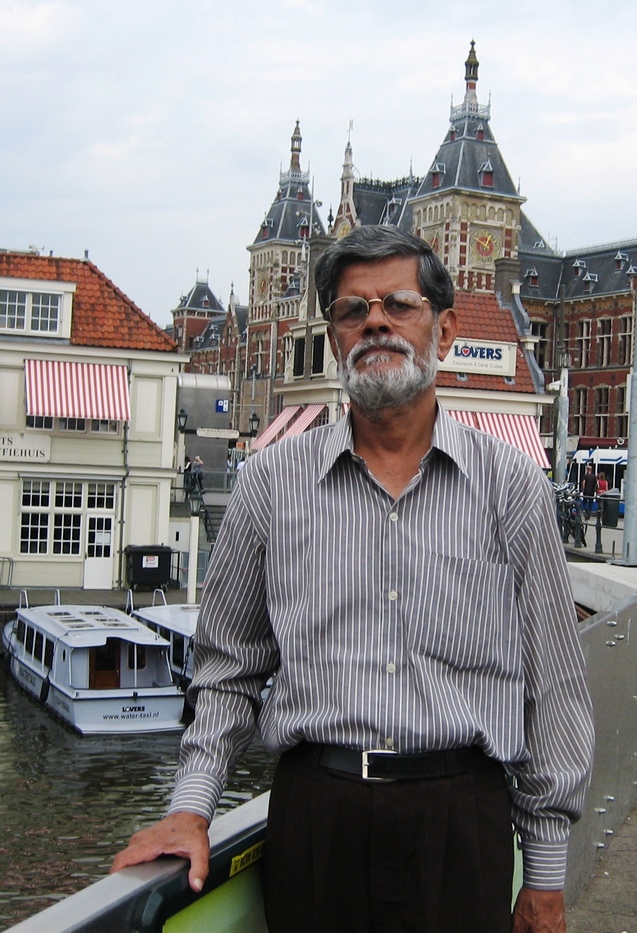Malay Roy Choudhury

Malay Roy Choudhury (born 29 October 1939) is an Indian Bengali poet, playwright, short story writer, essayist and novelist who founded the Hungryalist movement in the 1960s.
Roy Choudhury was born in Patna, Bihar, India, into the Sabarna Roy Choudhury clan, which owned the villages that became Kolkata. He grew up in Patna's Imlitala ghetto, which was mainly inhabited by Dalit Hindus and Shia Muslims. His was the only Bengali family. His father, Ranjit (1909–1991) was a photographer in Patna; his mother, Amita (1916–1982), was from a progressive family of the 19th-century Bengali Renaissance. His grandfather, Laksmikanta Roy Choudhury, was a photographer in Kolkata who had been trained by Rudyard Kipling's father, the curator of the Lahore Museum.
At the age of three, Roy Choudhury was admitted to a local Catholic school, and later, he was sent to the Oriental Seminary. The school was administered by the Brahmo Samaj movement, a monotheistic religion founded in 1830 in Kolkata by Ram Mohun Roy, who aimed to purify Hinduism and recover the simple worship of the Vedas. There, Roy Choudhury met student-cum-librarian Namita Chakraborty, who introduced him to Sanskrit and Bengali classics. All religious activities were banned at the school, and Roy Choudhury has said that his childhood experience made him instinctively secular.
Roy Choudhury has proficiency in English, Hindi, Bhojpuri and Maithili, apart from his mother tongue Bengali. He was influenced, though, by the Shia Muslim neighbors who recited Ghalib and Faiz in the Imlitala locality. At the same time his father had two workers Shivnandan Kahar and Ramkhelawan Singh Dabar at his photographic shop at Patna ; these two persons introduced Roy Choudhury to Ramcharitmanasa written by Tulasidasa as well as saint poets Rahim, Dadu and Kabir
Roy Choudhury did his Masters in Humanities. He later studied Rural Development which gave him a job to visit almost entire India for the upliftment of farmers, weavers, fishermen, artisans, craftsmen, potters, cobblers, landless labourers, jute farmers, potato growers and various under-caste Indians.
The Hungryalist movement was initially led by Roy Choudhury; his brother, Samir Roychoudhury; Shakti Chattopadhyay; and Haradhon Dhara, known as Debi Roy. Thirty more poets and artists subsequently joined them, the best-known being Rajkamal Chaudhary, Binoy Majumdar, Utpal Kumar Basu, Falguni Roy, Subimal Basak, Tridib Mitra, Rabindra Guha, and Anil Karanjai. The movement's English name was derived from Geoffrey Chaucer's line "in the sowre hungry tyme", and its philosophy was based on Oswald Spengler's "The Decline of the West".
Hungryalism petered out in 1965, when the West Bengal government issued arrest warrants for eleven Hungryalists, including Roy Choudhury and his brother. Some members, such as Subhash Ghosh and Saileshwar Ghosh, testified against Roy Choudhury in Kolkata's Bankshall Court. He was jailed for a month for his poem Stark Electric Jesus by Kolkata Bankshall Court in 1966. However he was exonerated by the Kolkata High Court in 1967. From the letters of Sunil Gangopadhyay written to Sandipan Chattopadhyay during 1964 published recently it is known that Sunil Gangopadhyay felt that Hungry generation literary movement was a threat to his Krittibas group of poets of 1950s.
Roy Choudhury went on to write poetry, fiction, plays, short stories and essays on Bengali social and cultural issues. He has written more than seventy books till date.
Howard McCord, a professor of English at Washington State University and Bowling Green University who met Roy Choudhury during a visit to Kolkata, wrote in City Lights Journal Number Three: "Malay Roy Choudhury, a Bengali poet, has been a central figure in the Hungry Generation's attack on the Indian cultural establishment since the movement began in the early 1960s. ... Acid, destructive, morbid, nihilistic, outrageous, mad, hallucinatory, shrill—these characterize the terri

